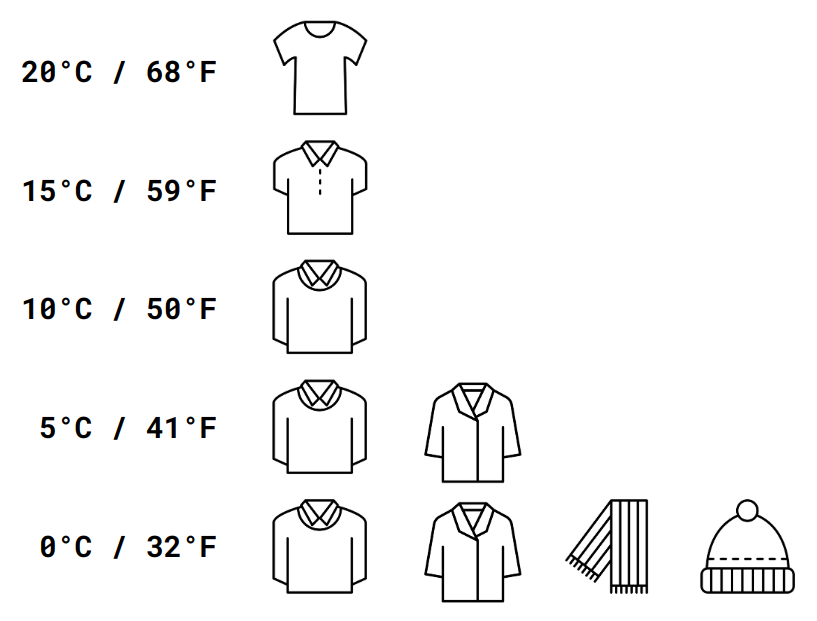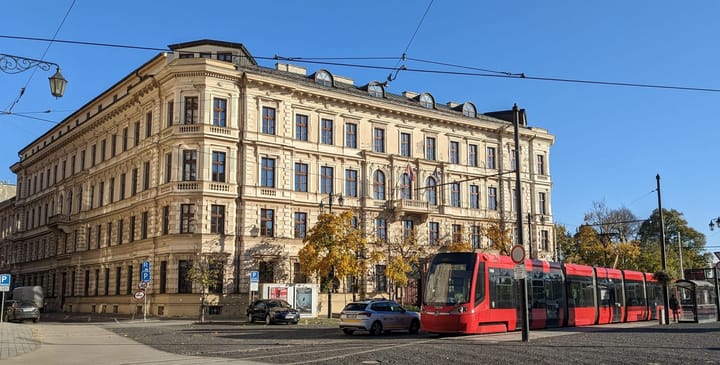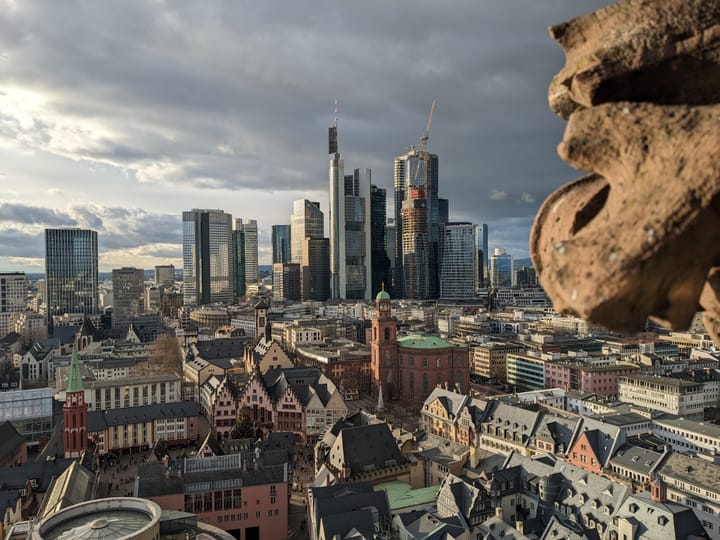What I've learnt about traveling

I spent my 20s pointedly not traveling anywhere. Then in 2019 two of my dearest friends organised a sweepingly gorgeous wedding in Assam, and the fire for travel was lit forever within my soul.
If you are planning a trip, allow me to offer these hard learnt lessons so you may profit from my mistakes and plan an amazing trip.
Plan ahead
- Plan activities, not destinations.
- Well planned trips are hard to organise, poorly planned trips are hard to enjoy.
- Be flexible on your flight's date and destination.
- Ensure every trip has a highlight and a great ending.
Pack light
- Dress in layers.
- Wear a belt without metal.
- Boots should be your default travel footwear.
- Do your own laundry.
- If it's lightweight, bring it from home.
- Pack medicines, they're insurance.
- Take a day bag.
- Don't take a book.
Be savvy
- Get a local SIM / global e-SIM.
- Complete a short photography course before you go.
- Hotel gyms are a lie, do calisthenics instead.
- Take toilet paper from the hotel. You'll be glad you did.
- Keep your receipts.
Plan ahead
Plan activities, not destinations. I learnt this when I booked four days in Trincomalee on the basis that it was a beach-side town of 100k people which in 1942 was bombed by the Japanese. Surely it would have lots of history, food and nature to enjoy. And it did, but inside of 24 hours I'd done everything I wanted to do. If I'd planned my activities (Snorkel here! Dine there!), not my location, I'd have realised I only needed a day. Pro-tip: Nomadic Matt is a great website for finding activities you might enjoy.
Well planned trips are hard to organise, poorly planned trips are hard to enjoy. Planning a trip, it can be stressful simply booking flights and accommodation. It's tempted to leave it at that and sort out the rest when you arrive. But that's a terrible It's hard also to plan trips mid-flight. Tours need a few days notice. The first activity would have been better as the third activity because it's near the fourth activity. Plan what you'll do each day to ensure you make best use of your time and minimise the planning burden on your jet-lagged brain during the holiday.
This isn't always true though. If you're ideal holiday is hotel -> breakfast -> hotel -> lunch -> hotel -> dinner, then you don't need much planning. But if you want to do some activity in particular, planning is advised.
Be flexible on your flight's date and destination. You can fly cheap if you compromise on when and where you fly (or get very lucky). Think of it as s a triangle of flight date, destination and price. If you have a fixed destination, you need to be flexible about when you fly, or else it'll be very expensive.

Research your destination. Most travelers go to interesting places without an understanding of why or wherefore it's interesting. But context is that which is scarce. If you know nothing of you destination, read the simple Wikipedia entry. If you’re knowledge hungry, read the regular Wikipedia. If you have time, read a book.
Go for a weekend, a week or a year. The amount of gear you need to take lends itself to three types of trips: short, moderate and very long.
If you travel for a weekend, you can travel super light. Razor? Use the hotel's care pack or shave when you get back. Dirty clothes? Wash them when you get back.
If you travel for 2+ days, however, then you'll need to bring more stuff - spare clothes, extra toiletries, etc. And that extra stuff will facilitate not just one extra day of travel but 7-10 days travel total. That razor you bring to shave on day 3? You can use that on day 5 and day 7, etc.
If you travel 10+ days then you'll need to bring even more stuff - maybe a laptop, laundry items like a wash bag, etc. Once you have all those in place, you will have almost everything you need to travel travel for not just 10 days, but an entire year.
Ensure every trip has a highlight and a great ending. Memory operates accordingly to the peak-end rule. We tend to remember the best part of an experience, and we tend to remember to end. If you want your travel to create positive, lifelong memories, plan your travel to have one big highlight and to end on a high note.
The logical extension of the peak-end rule is to go on many short trips, or mentally segment your longer trips. Whether your trip is one day or one year, your memory tends to condense it to one highlight and one end note. Taking many shorter trips means many more highlights and many more positive end notes.
Pack light
I've written a whole packing list here, but the tl;dr is:
Pack fewer heavy things than you think you need. At the end of a trip you should review what you didn't use and resolve to never pack such things again.
Wear layers. It's better to take two light-weight shirts that can be worn together than one heavy-weight top.

Wear a belt with a plastic buckle. Get a belt without any metal so you don't need to remove it at airport security. I got a super cheap nylon-plastic belt on Etsy cut it to length and cauterized it with a lighter. Fancier travel belts are also available.
Boots should be your default travel footwear. Unless you're going to a wedding or presenting to the CEO, just wear hiking boots. You're going to do a lot of walking. Many countries have terrible sidewalks. You need to keep your feet stable and protected - that means boots.
Do your own laundry. 1) Get a dry bag to do your own laundry in your hotel room. I've used hotel laundry services, they're expensive and seldom suit your travel plans. Bring a dry bag and launder your clothes yourself. 2) If you don't bring a dry bag, book a hotel near a coin-laundry.
If it's lightweight, bring it from home. Buying travel essentials as you go is cognitively and time inefficient. Do you want to spend one day of a two day trip searching for a local pharmacy? Unless it’s heavy, bring it from home. That said, it's not the end of the world if you buy supplies as you go.
Pack medicines. It's easy to be optimistic about your health before your trip. But if you do get sick, then not having a treatment handy will be a huge deal. Blisters, mouth ulcers, an itchy rash or a sniffy nose can dampen any trip. Pack light weight medicines to deal with these. You may not need them, but they're insurance. If you need them, you'll be glad you brought them.
Take a day bag. It should be light and around 43 x 33 x 20 cm in size. I use a GoRuck Laptop 16" on flights so I don't have to access the overhead compartment for my laptop, battery, headphones or snacks. It doubles as a (rough) pillow when I sleep in airports. On day tours, I pack it with an extra layer, snacks, toilet paper, umbrella and a water bottle while my main bag stays in a hotel room / locker.
Don't bring a book. Books are heavy. Bring a Kindle instead, which weighs very little. Or download a book on Audible, which weighs nothing. If you don't have Audible, download a podcast. Podcasts are just books that try to sell you an Audible subscription.
Oh, and Australia has the finest sunscreen in the world, take some with you. Put it on every morning as part of your skincare regime.
Fly smart
If you're flying out of a major city, traffic to and from the airport is not insignificant. You'll need extra time to catch flights just after the morning or afternoon commute. Early morning and late night flights you will positively sail towards the airport.
- In Singapore, it's cheaper to get a Grab than a taxi to/from Changi Airport. it's cheaper still to take the train.
- When flying east to west, try to arrive at your destination close to evening. That way you'll just have a 'long day', push on to night and then fall asleep in sync with your new timezone.
There are a few advantages to getting a window seat
- The view is nice if you're flying over land during the day. That said I once had a window seat on a night flight and saw an epic thunderstorm in the distance.
- You can leave the window a crack open to help stay awake during the day.
Behave like a seasoned traveler
Get a local SIM. Don’t buy these international SIM malarkey, go with your hotel driver to a local phone retailer and point to the local SIM you want on the local brochure. Bring your passport, license and polite unwillingness to leave without a sim. Providers like giffgaff provides coverage of the UK & EU, and will mail a UK SIM card to your house anywhere in the world. Order one before you leave.
Get an eSIM. Many nations let you download an eSIM rather than install a physical SIM. Opt for an eSIM whenever possible to save yourself from having to swap physical SIMs. I use an Amaysim eSIM in Australia and a MyRepublic eSIM in Singapore.
Complete a short photography course. Even if you’re not going to take photos, you will, and you will cherish them the rest of your life. I did a short course in Melbourne and my photos became less bad immediately. Sign up for a 365 Day Photo Challenge and get the hang of your camera before your go. You will thank yourself.
Hotel gyms are a lie. They are, at best, two dumbbells and a treadmill. Learn calisthenics, practice every day.
Take a head sock. This is surprisingly useful for a simple loop of fabric if you don't mind rocking a very casual look. You can pull in taut over your mouth as an impromptu face mask. You can pull it over your eyes to help catch some sleep. You can wear it as a headband to mop up sweat on a hike. You can wear it loose around your neck to prevent sunburn. I got mine from an army supply store, but they're available online too.
Keep your receipts. Receipts weigh nothing, stash them in an envelope under the least used flap of your backpack. You will need receipts if you make a travel insurance claim. Think of each receipt as a lottery ticket with a 10% chance of clawing back $300 of lost airfares.
Take toilet paper from the hotel. Keep in your day bag and replenish regularly. You will probably get a runny nose, you may get the runs, you will not always have a bathroom with toilet paper. Toilet paper has a weight:utility ratio that is frankly insane.
Travel with old friends or make new friends? Do both, they’re the actual best.


